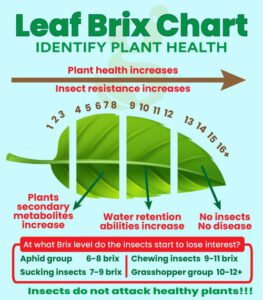
Brix in relation to crop health and quality
Brix in relatie tot gezondheid en kwaliteit van gewassen. De zoete wetenschap van Brix. Brix in relatie tot gezondheid en kwaliteit van gewassen. Brix-waarde verwijst
More yield from better quality
All in just 5 products
25+ years of fertilizer experience
Better and cheaper
Easy to use
One application that is gaining recognition is the use of organic hormones derived from plant extracts in fertilizers.
Organic hormones offer numerous benefits, including improved plant growth and development, increased resistance to stressors, improved nutrient uptake and reduced environmental impact. In this article, we explore the benefits of using organic hormones from plant extracts in fertilizers and their potential to revolutionize today's crop production.
Gen1:11 is enriched with various plant extracts that naturally include the following plant hormones: auxins, cytokinins, gibberellins, triacontanol and salicylic acid. In addition, our extracts also contain vitamins, amino acids, humates, silicon, etc....
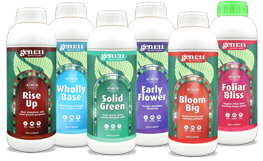
Organic hormones from plant extracts, such as auxins, cytokinins and gibberellins, play an important role in regulating various physiological processes in plants. When incorporated into fertilizers, these hormones can stimulate cell division, elongation and differentiation, resulting in improved root and shoot growth. By encouraging the growth of healthy plant tissues, organic hormones contribute to improved crop yields, better quality products and higher overall productivity.
One particular plant hormone with proven benefits is triacontanol. Triacontanol has been found to significantly enhance photosynthesis in plants. It activates the enzymes involved in photosynthesis, leading to increased chlorophyll production and enhanced carbon dioxide assimilation. This hormone promotes the efficient conversion of sunlight into chemical energy, resulting in a higher rate of photosynthesis and more biomass for the plant. By including triacontanol in fertilizers, growers can optimize the photosynthetic capacity of crops, thereby improving overall growth and productivity.
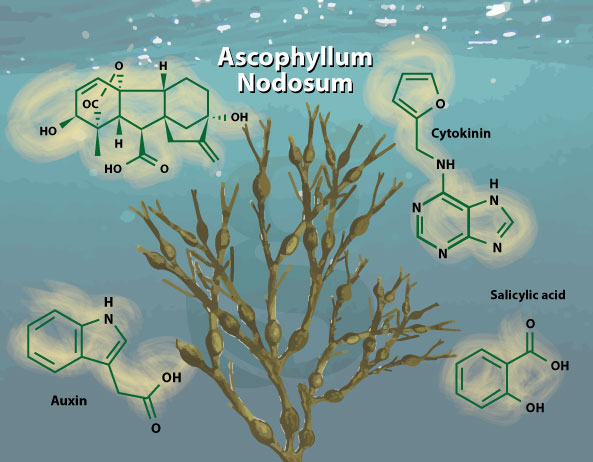
Salicylic acid is known for its ability to activate plant defense mechanisms, enhancing plant immunity to various diseases, pests and pathogens. When plants are exposed to salicylic acid, they activate a series of biochemical reactions that strengthen their natural defenses. This hormone triggers the production of antimicrobial compounds, such as phytoalexins, which inhibit the growth of pathogens. In addition, salicylic acid increases the production of defense genes and promotes the synthesis of pathogenic proteins that help fight disease. By incorporating salicylic acid from the bark of the white willow into fertilisers, growers can provide plants with a natural defense mechanism.
Organic hormones aid in the efficient uptake and utilization of essential nutrients by plants. For example, auxins facilitate the uptake of mineral nutrients, especially phosphorus, by increasing root surface area and promoting root branching. Cytokinins, on the other hand, enhance the translocation of nutrients within plants, leading to better distribution and more efficient use of nutrients. By incorporating organic hormones into fertilisers, farmers can optimize nutrient uptake, reduce fertilizer waste and minimize nutrient leaching, leading to cost savings and reduced environmental pollution.
Plants often face various environmental stressors such as drought, heat, salinity and disease. Organic hormones derived from plant extracts have been shown to improve the stress resistance of plants. By including organic hormones in fertilizers, growers can strengthen the resistance of their beloved creations and ensure more stable and reliable harvests.
Fortunately, the use of synthetic hormones is usually banned. Organic hormones derived from plant extracts offer a more sustainable and environmentally friendly alternative. These hormones are biodegradable and pose no risk to soil organisms, aquatic ecosystems and human health. By using biological hormones in fertilisers, growers can promote crop health and increase yield and quality.
Conclusion:
The inclusion of biological hormones derived from plant extracts in fertilizers offers numerous benefits to any grower. These hormones contribute to improved plant growth and development, more efficient nutrient uptake, increased stress tolerance and reduced environmental impact. In our quest to optimize the quality of our organic-mineral fertilizers, harnessing the power of organic hormones offers an exciting opportunity to revolutionize the way we grow beloved creations.

Brix in relatie tot gezondheid en kwaliteit van gewassen. De zoete wetenschap van Brix. Brix in relatie tot gezondheid en kwaliteit van gewassen. Brix-waarde verwijst
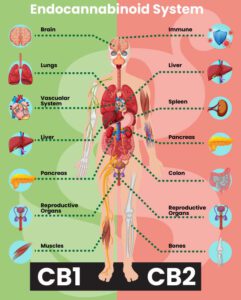
Het endocannabinoïde systeem begrijpen Een korte handleiding voor CB1- en CB2-receptoren Het endocannabinoïde systeem (ECS) speelt een fundamentele rol bij het reguleren van verschillende fysiologische
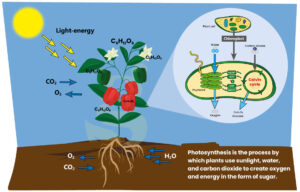
Photosynthesis Photosynthesis is the process by which green plants, algae and some bacteria convert light energy into energy in the form of glucose. This process mainly takes place

7 handy tips to prepare for the new garden season Gardening tasks when the spring jitters strike: Spring is a time of renewal and

The development of hydroponic fertilisers through the ages The history of hydroponics is a story of innovation and perseverance, rooted in the quest of the

Creating a successful indoor grow involves more than just light and water. Here are 7 tips to boost your indoor garden.
Brix in relatie tot gezondheid en kwaliteit van gewassen. De zoete wetenschap van Brix. Brix in relatie tot gezondheid en kwaliteit van gewassen. Brix-waarde verwijst
Het endocannabinoïde systeem begrijpen Een korte handleiding voor CB1- en CB2-receptoren Het endocannabinoïde systeem (ECS) speelt een fundamentele rol bij het reguleren van verschillende fysiologische
Photosynthesis Photosynthesis is the process by which green plants, algae and some bacteria convert light energy into energy in the form of glucose. This process mainly takes place
7 handy tips to prepare for the new garden season Gardening tasks when the spring jitters strike: Spring is a time of renewal and
The development of hydroponic fertilisers through the ages The history of hydroponics is a story of innovation and perseverance, rooted in the quest of the
Creating a successful indoor grow involves more than just light and water. Here are 7 tips to boost your indoor garden.
Home » Natural Plant Hormones

Because growing your own is a craft. It takes time, energy, focus, attention, maybe even love. At your own pace, in your own environment. You are the creator.